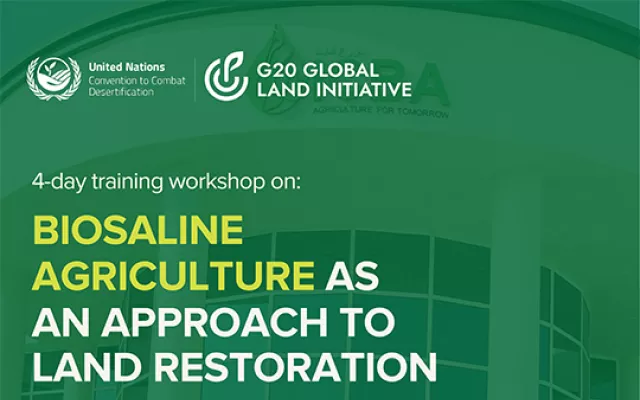First-hand insight as high school students visit ICBA
26 March 2014
The International Center for Biosaline Agriculture (ICBA) hosted the high school students of the neighboring Lycée Français International Georges Pompidou (LFIGP) to share information on the agricultural research carried out by scientists at the center. In their visit the students learned about the importance of tackling the problems of salinity and water scarcity locally and regionally; how to manage plants that can survive in harsh environments; and which strategy to adopt at the water, soil and plant level.
Dr. Khaled Masmoudi, Senior Molecular Biologist at ICBA spoke with the students about his work in molecular biology as it related to their current studies in life and earth sciences.
During the field visit, the students were able to see experiments on barley screening for salinity tolerance. This project is a collaboration between ICBA and King Abdullah University of Science and Technology (KAUST) in Saudi Arabia. As Dr. Masmoudi explained “We are screening around 1850 lines for salinity tolerance. The experiment was designed using the SCADA system, an automated irrigation system, using fresh water and salt water 15-17 dS m-1 (high salinity levels) to screen lines that will be further characterized in the future to come up with tolerant lines that can be introduced in the breeding programs and can help farmers to increase their incomes”.
The students also had the opportunity to learn about the promising new crop for the region: quinoa. Quinoa is a ‘pseudo-grain’ very rich in vitamins, amino acids, and proteins and is suitable for marginal environments as some of the varieties are very tolerant to salinity. Dr. Masmoudi added, “Current research being undertaken by ICBA scientists is screening for some of the varieties to be used in the future for rehabilitation of abandoned farms in the UAE and the region.”
The students from Lycée Français International Georges Pompidou also visited the date palm experiments at ICBA and learned about the importance of date palm for the region and their variable levels of salt and temperature tolerance. ICBA is currently developing a collaboration and partnership with New York University in Abu Dhabi on genomics in date palm to characterize the variability in the region and to develop new varieties that could be tolerant to salinity and water use efficiency.
Dr. Masmoudi concluded that he was pleased to have the opportunity to interact with the students. “It is very important for ICBA to be active within its local community in addition to its international efforts” said Dr. Masmoudi.










